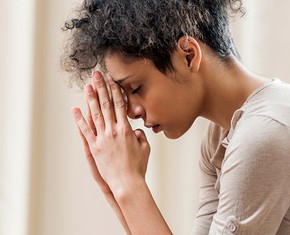The views expressed in our content reflect individual perspectives and do not represent the authoritative views of the Baha'i Faith.
Our cultures condition us to react with an enormous amount of fear and silence when the subject of death comes up – but it doesn’t have to be that way, says a new “positive death” philosophy.
Many people view death as a terrible event, as the final end to our existence, as something to be avoided at all costs, despite the inescapable fact that death happens to everyone, with no exceptions.
Every life gets one birth and one death, but our society’s denial and avoidance of death make us want to turn away when the end of our physical existence approaches, either for us or someone we love.
The Baha’i teachings counsel all humanity not to fear death – in fact Baha’u’llah, the prophet and founder of the Baha’i Faith, wrote “I have made death a messenger of joy to thee. Wherefore dost thou grieve? I made the light to shed on thee its splendor. Why dost thou veil thyself therefrom?”
RELATED: How Do We Face Our Own Death?
That message seems to be penetrating human consciousness lately, in many places around the world, with the rise of a movement that treats death as a positive part of our existence.
When you look, you can find this movement everywhere, in articles, books, YouTube videos, academic studies, new ways of regarding the end of life and burial, within the rapidly-expanding hospice movement, in the rise of a new profession called “death doulas,” and even in lively discussion groups on sites like Death Cafe, where people gather to talk openly about this previously taboo subject.
Major news outlets have even begun to cover the positive death movement, with this recent New York Times article one good example.
The principles of the positive death movement, along with other changing attitudes about the end of life, have even begun to alter the ways we die. Statistically, a much larger number of people today die at home or in hospice than in hospitals, reversing a long-term trend. Rather than insisting on last-gasp interventions in high-tech hospitals, more and more people are opting for a gentler and quieter passing. Many of us now have living wills or advance medical directives, as well, saying that no heroic measures should be taken to extend life in older people, and that we should not be kept alive with artificial means.
Here are eight “death-positive” principles from one thoughtful website called The Order of the Good Death:
- I believe that by hiding death and dying behind closed doors we do more harm than good to our society.
- I believe that the culture of silence around death should be broken through discussion, gatherings, art, innovation, and scholarship.
- I believe that talking about and engaging with my inevitable death is not morbid, but displays a natural curiosity about the human condition.
- I believe that the dead body is not dangerous, and that everyone should be empowered (should they wish to be) to be involved in care for their own dead.
- I believe that the laws that govern death, dying and end-of-life care should ensure that a person’s wishes are honored, regardless of sexual, gender, racial or religious identity.
- I believe that my death should be handled in a way that does not do great harm to the environment.
- I believe that my family and friends should know my end-of-life wishes, and that I should have the necessary paperwork to back-up those wishes.
- I believe that my open, honest advocacy around death can make a difference, and can change culture.
In essence, this movement is a spiritual one – a way of thinking and feeling that accepts the arc of a human life and recognizes the value of death as a normal and natural part of that life.
For Baha’is, death truly is a messenger of joy – a second birth into an afterlife that excels even the beauty of this physical plane of existence. Baha’is firmly believe that each human soul has an eternal life, and that all souls ascend after death to that “second life,” as Baha’u’llah described it:
This life cometh to an end with physical death, which is a God-ordained and inescapable reality. That life, however, which is mentioned in the Books of the Prophets and the Chosen Ones of God is the life of knowledge … that blessed and everlasting life that perisheth not: whosoever is quickened thereby shall never die, but will endure as long as His Lord and Creator will endure.
The first life, which pertaineth to the elemental body, will come to an end, as hath been revealed by God: “Every soul shall taste of death.” But the second life, which ariseth from the knowledge of God, knoweth no death …
With this positive view of death in mind, we can all engage with our own passing or the passing of a loved one without fear or despair. We can better prepare ourselves and our family members in compassionate ways, make the experience of death less frightening, normalize talking about it, and begin to consider what to expect after our physical bodies stop functioning.
RELATED: What Comes After Life? There is More to Us Than We Can Ever Know
Our physical death will come to each one of us. But as Abdu’l-Baha pointed out, in this talk he gave in Paris in the early 20th century, the inner human spirit will never die:
Though death destroy his body, it has no power over his spirit – this is eternal, everlasting, both birthless and deathless.
As to the soul of man after death, it remains in the degree of purity to which it has evolved during life in the physical body, and after it is freed from the body it remains plunged in the ocean of God’s Mercy.
From the moment the soul leaves the body and arrives in the Heavenly World, its evolution is spiritual, and that evolution is: The approaching unto God.
















Comments
Sign in or create an account
Continue with Googleor